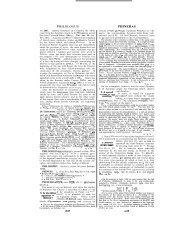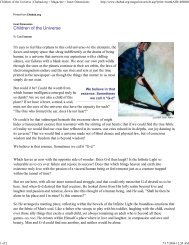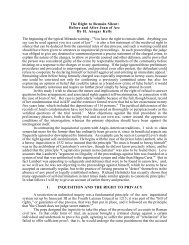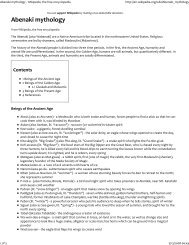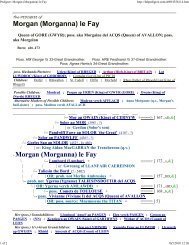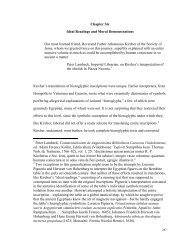sefi;g:v. - A Kabbalist walks into a bar, and the
sefi;g:v. - A Kabbalist walks into a bar, and the
sefi;g:v. - A Kabbalist walks into a bar, and the
Create successful ePaper yourself
Turn your PDF publications into a flip-book with our unique Google optimized e-Paper software.
SENNACHERIB SENNACHERIB<br />
palace, acquiring great spoil. He <strong>the</strong>n sent after Merodach-baladan<br />
an army which searched <strong>the</strong> swamps where<br />
he had taken refuge ; but <strong>the</strong> wily Chaldaean escaped.<br />
Sennacherib <strong>the</strong>n proceeded to conquer <strong>the</strong> country, city<br />
by city. He seems to have had to fight with a number<br />
of tribes, Urbi, Aramu, <strong>and</strong> Chaldaeans, who had<br />
occupied Erech, Nippur, Kisu, HarHagkalama<strong>and</strong> Cutha,<br />
<strong>and</strong> boasts of having captured 89 strong cities as well<br />
as 820 smaller cities in Chaldaea. On his retnrn to<br />
Babylon he had to pacify <strong>the</strong> country, <strong>and</strong> rescue it from<br />
<strong>the</strong> hordes of Aramaean <strong>and</strong> Chaldaean peoples, who<br />
would not acknowledge him as king.<br />
does not state <strong>the</strong> grounds of his quarrel. But doubtless<br />
all <strong>the</strong> West had become very backward in payment<br />
of tribute. Sennacherib says that Lull fled from Tyre<br />
to Cyprus <strong>and</strong> that all his country fell <strong>into</strong> Assyrian<br />
h<strong>and</strong>s. Great Sidon <strong>and</strong> Little Sidon, Beth-zait, Sarepta,<br />
Mahalliba, Ugh, Achzib, <strong>and</strong> Accho are named as<br />
fortresses captured from Luli. Sennacherib set up<br />
Ethobal as vassal king over a new kingdom of Sidon.<br />
Tyre he could not reduce.<br />
The vassal kings <strong>and</strong> semi-independent rulers of Syria<br />
<strong>and</strong> Palestine now hastened to secure exemption from<br />
pillage by tribute <strong>and</strong> submission. Menahem of Samsi-<br />
Sennacherib enumerates <strong>the</strong> Tu'muna Ribihu Iadsku murCma, Abdi-li'ti of Arvad, Urumilki of Gebal, Mitinti<br />
Uhudu Kipre Malihu, Gurumu, Ubulu bamun; 'Gambdlu: of Ashdod, Pudu-ilu of Ammon, KaniuS-nadah of<br />
Hindak, Ru'k Pukcdu, Hanlrlnp, Uagdr3nu Nadatu Li'tau,<br />
Aramu. The number of his captives he puts At The Moab, Airamniu of Edon, all called kings of <strong>the</strong> Martu-<br />
208,oob.<br />
nature of <strong>the</strong>se tribes is indicated by <strong>the</strong> spoil taken from <strong>the</strong>m : l<strong>and</strong>, submitted. Sidka of Ashkelon stood out, was<br />
7200 horses, 11,073 asses, 5230 camels, 80 TOO oxen, 800,500 captured <strong>and</strong> with all his belongings carried to Assyria.<br />
sheep. The country was clearly over-run hy)nomads.<br />
He had apparently come to <strong>the</strong> throne by a revolution<br />
It is evident that Assyria had completely lost control<br />
of <strong>the</strong> country. Sennacherib had to reconquer it. The<br />
Babylonian Chronicle <strong>and</strong> a fragment of <strong>the</strong> Canon List<br />
which had expelled Sarru-ltiddki, son of Rukipti, whom<br />
Tiglath-pileser 111. had sei over Ashkelon, about 734<br />
B. c. Hence he probably expected no mercy if he subplace<br />
a conquest of Larak <strong>and</strong> Sarablnu in 704 B.C. mitted. ~anu-lhdlri was reinstated. Sennacherib <strong>the</strong>n<br />
This doubtless marked <strong>the</strong> commencement of <strong>the</strong> recon- reduced Beth-dagan, Joppa, Bene<strong>bar</strong>ka. <strong>and</strong> Azor which<br />
quest. But <strong>the</strong> campaign clearly lasted beyond 702 had been under Sidka's rule.<br />
B.C., when Sennacherib set BCl-ibni on <strong>the</strong> throne of 'The nobles <strong>and</strong> people of Ekron had rebelled against<br />
Babylon. This prince had been brought up at <strong>the</strong> <strong>the</strong>ir king Padi, a faithful vassal of Assyria, put him in<br />
Assyrian court, but was of <strong>the</strong> old Babylonian seed chains, <strong>and</strong> sent him to Hezekiah, king of Judah, to<br />
royal, for all <strong>the</strong> sources acknowledge him as legitimate keep in prison. When Sennacherib advanced against<br />
monarch, <strong>and</strong> <strong>the</strong> Babylonian Kings' List ascribes him Ekron, he was faced by a great army of <strong>the</strong> kings of<br />
to ' <strong>the</strong> dynasty of Babylon,' <strong>and</strong> gives him a reign of Musur, with troops, archers, chariots, <strong>and</strong> horsemen<br />
three years. He was, of course, a vassal king.<br />
Sennacherib assigns to this period <strong>the</strong> submission of<br />
from Melubha. This army he defeated at Eltekeh.<br />
capturing <strong>the</strong> sons of <strong>the</strong> kings of Musur <strong>and</strong> <strong>the</strong> generals<br />
Nabti-Ml-lumlte, klpu of Hararlti, <strong>and</strong> <strong>the</strong> destruction sent from Meluhba. He <strong>the</strong>n stormed Eltekeh <strong>and</strong><br />
of Hirimmu. Some of Sennacherib's inscriptions follow Timnath. Ekron soon submitted. After wiping out<br />
<strong>the</strong> plan of presenting toge<strong>the</strong>r <strong>the</strong> events connected <strong>the</strong> conspirators <strong>and</strong> enslaving <strong>the</strong>ir supporters Sennawith<br />
one district. Thus we learn that after Bel-ibnl cherib reinstated Padl, whom he says he ' brought forth<br />
had proved faithless or inefficient, Sennacherib once out of Jerusalem.'<br />
more marched to Babylon <strong>and</strong> deposed him, setting Sennacherib <strong>the</strong>n proceeded to ravage Judah, captur-<br />
Alur-nldin-Sum. his own son, on <strong>the</strong> throne. The Baby- ing forty-six great fortresses <strong>and</strong> smaller cities ' without<br />
lonian Chronicle places <strong>the</strong> pillage of Hararlte <strong>and</strong><br />
Hirimmu in 702 B. c., <strong>and</strong> associates <strong>the</strong> accession of<br />
number,' ' counting as spoil ' 200,150 people. He does<br />
not claim to have captured Jerusalem. He says of<br />
ASur-nldin-Sum with Sennacheribs pillage of Akkad, Hezekiah, 'him, like a caged bird, within Jerusalem,<br />
or Nor<strong>the</strong>rn Babylonia. Bl-ibnl was called away to his capital, I shut in, forts against him I raised, <strong>and</strong> I<br />
Xssyria. It was probably during Sennacherib's absence<br />
in <strong>the</strong> West that Bel-ibnl became disgraced. ASurnadin-5uni<br />
was acknowledged king in Babylon according<br />
to all sources ; but <strong>the</strong> Kings' List assigns him to <strong>the</strong><br />
dynastyof Habigal. He reigned six years, 699-693 B.C.<br />
Sennacherib owed Elam a grudge for supporting<br />
Merodach-baladan against him. In his second campaign,<br />
as he calls it, before September 702 B.C., when<br />
<strong>the</strong> Bellino Cylinder is dated, he marched an army<br />
towards Elani. The KaHB, who had once furnished<br />
<strong>the</strong> ruling dynasty of Babylonia, about 1725-1155 B.C.,<br />
<strong>and</strong> a neighbouring tribe, <strong>the</strong> Iasubigalli, on <strong>the</strong> borders<br />
of Babylonia <strong>and</strong> Elam, who had never been subjected<br />
to Assyrian rule, were now ravaged. The neighbouring<br />
kingdom of Ellipi. once subject to Sargon, was also<br />
pillaged. As in Sargon's case, some distant tribes of<br />
<strong>the</strong> Medes sent presents. Sennacherib boasts that his<br />
predecessors had not even heard <strong>the</strong> names of <strong>the</strong>se<br />
peoples. But although Ekm was threatened, it does<br />
not seem that Sennacherib made any direct attack this<br />
time. His h<strong>and</strong>s were soon full in ano<strong>the</strong>r quarter.<br />
How long <strong>the</strong> West had been in rebellion does not<br />
appear ; but Sennacherib calls <strong>the</strong> campaign in which<br />
he proceeded to bring <strong>the</strong> West to submission his third.<br />
This is ascribed by general consent to 701 B.C. Belibni<br />
was settled in Babylon, <strong>and</strong> Sennacherib was free<br />
repulsed whoever came out of his city gate <strong>and</strong> tore it<br />
up' ; but <strong>the</strong>re is no mention of capture. The captured<br />
cities were annexed to <strong>the</strong> dominions of Metinti of<br />
Ashdod, Padi of Ekron, <strong>and</strong> Silli-bC1 of Gaza. What<br />
caused Sennacherib to leave Judah we are not told : but<br />
it is nearly certain that troubles in Babylon were again<br />
pressing. The army left behind under <strong>the</strong> Tartan <strong>and</strong><br />
Rabshakeh would be well able to carry on a siege ; but<br />
Hezekiah would not push matters to <strong>the</strong> point of st<strong>and</strong>ing<br />
a long siege. He did submit, as is evident from<br />
<strong>the</strong> tribute which, Sennacherib says, was sent after him<br />
to Nineveh. It amounted to 30 talents of gold, 800<br />
talents of silver, <strong>and</strong> an enormous amount of precious<br />
stones <strong>and</strong> palace furniture,besides Hezekiah's daughters,<br />
his eunuchs, musicians, etc. Sennacheribs account of<br />
<strong>the</strong> submission seems to imply that it was <strong>the</strong> IJrbi,<br />
Arabs whom Hezekiah had received <strong>into</strong> <strong>the</strong> city to<br />
streng<strong>the</strong>n it, who really gave in, <strong>and</strong> so forced <strong>the</strong><br />
king to submit. They may have been a garrison from<br />
Melukha. These events are recorded on Cylinder B,<br />
which is dated in <strong>the</strong> Eponymy of Mitunn, 700 B.C.<br />
That <strong>the</strong> account is complete no one can pretend. It<br />
makes no mention of Lachish, although <strong>the</strong> celebrated<br />
scene of Sennacherib receiving <strong>the</strong> submission of that<br />
city shows <strong>the</strong> great importance attached by him to its<br />
capture. Whe<strong>the</strong>r Lachish was one of <strong>the</strong> forty-six<br />
to attend to <strong>the</strong> West at that time; but we have no great fortresses, or not, it seems probable, as it was<br />
explicit statement of date from cuneiform sources. The only IO m. or so from Eltekeh, that it was captured in<br />
first move was against Tyre. Eululaeus, whom Sennacherib<br />
calls Lull king of Sidon, according to Men<strong>and</strong>er,<br />
as quoted by Josephus, had gone to Citium in Cyprus<br />
to establish his authority. He was thus committing a<br />
technical act of war against Sennacherib. The latter<br />
this expedition.<br />
What was <strong>the</strong> exact nature of Bel-ibnl's fault we do<br />
not know ; but Merodach-baladan's activity in <strong>the</strong> Seal<strong>and</strong><br />
<strong>and</strong> <strong>the</strong> unrest of Marduk-uWih in Chaldaea<br />
caused Sennacherib to attack <strong>the</strong> sou<strong>the</strong>rn portion of<br />
4363<br />
4364



